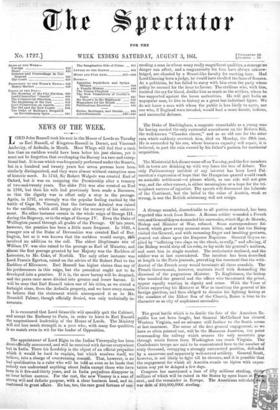The appointment of Lord Elgin to the Indian Viceroyalty has
been demi-officially announced, and will be received with favour everywhere but in India. There his Lordship is the object of an official prejudice which it would be hard to explain, but which resolves itself, we believe, into a charge of overweening conceit'. That, however, is no bad qualification in a ruler who will be told as soon as he lands that nobody can understand anything about India except those who have been in it five-and-thirty years, and in India prejudices disappear in an hour before success. For the rest, the new Viceroy is a man of strong will and definite purpose, with a clear business head, and ac- customed to great affairs. He has, too, the rare good fortune of suc- ceeding a man in whom many really magnificent qualities, a courage no danger can affect, and a magnanimity his foes have always acknow- ledged, are clouded by a Stuart-like faculty for exciting hate. Had Lord Canning been a judge, he would have rivalled the fame of Somers. As a politician, he has failed to carry with him even the party whose policy lie seemed for the hour to favour. The civilians who, with him, resisted the cry for blood, dislike him as much as the settiers, whom he has supported against the home authorities. He will quit India an unpopular man, to live in history as a great but indistinct figure. We do not know a man with whom the public is less likely to agree, nor one who, if England were invaded, would lead a more heroic, tedious,. and successful defence.






























